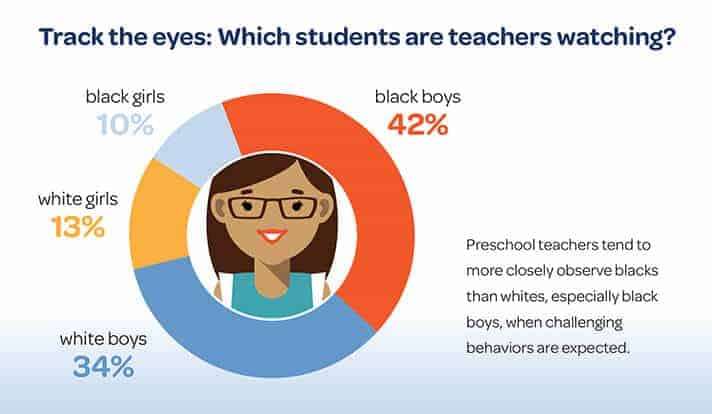Preschool teachers and staff show signs of implicit bias in administering discipline, but the race of the teacher plays a big role in the outcome, according to research conducted by the Yale Child Study Center. The results help explain why black students tend to be suspended at much higher rates than white students, the authors say.
Release of the findings has been requested by the U.S. Department of Health and Human Services and is scheduled to be presented to federal and state officials on Sept. 28.
Researchers used sophisticated eye-tracking technology and found that preschool teachers “show a tendency to more closely observe black students, and especially boys, when challenging behaviors are expected,” the authors found.
But at the same time, black teachers hold black students to a higher standard of behavior than do their white counterparts, the researchers found. While the study did not explore why this difference in attitude exists, the researchers speculated that black educators may be demonstrating “a belief that black children require harsh assessment and discipline to prepare them for a harsh world.”
White educators, by contrast, may be acting on a stereotype that black preschoolers are more likely to misbehave in the first place, so they judge them against a different, more lenient standard than what they’re applying to white children.
“The tendency to base classroom observation on the gender and race of the child may explain in part why those children are more frequently identified as misbehaving and hence why there is a racial disparity in discipline,” added Walter S. Gilliam, director of The Edward Zigler Center in Child Development and Social Policy and associate professor of child psychiatry and psychology at the Yale Child Study Center. Gilliam is one of five researchers who conducted what is thought to be the first such study of its type.
Findings suggested that when the preschool teacher and child were of the same race, knowing about family stressors led to increased teacher empathy for the preschooler and decreased how severe the behaviors appeared to the teacher. But, when the teacher and child were of a different race, the same family information seemed to overwhelm the teachers and the behaviors were perceived as being more severe.
“These findings suggest that teachers need support in understanding family struggles, as they may related to child behaviors, especially when the teacher and child are of different races,” Gilliam said.
Primary funding for the research came from the WK Kellogg Foundation.


